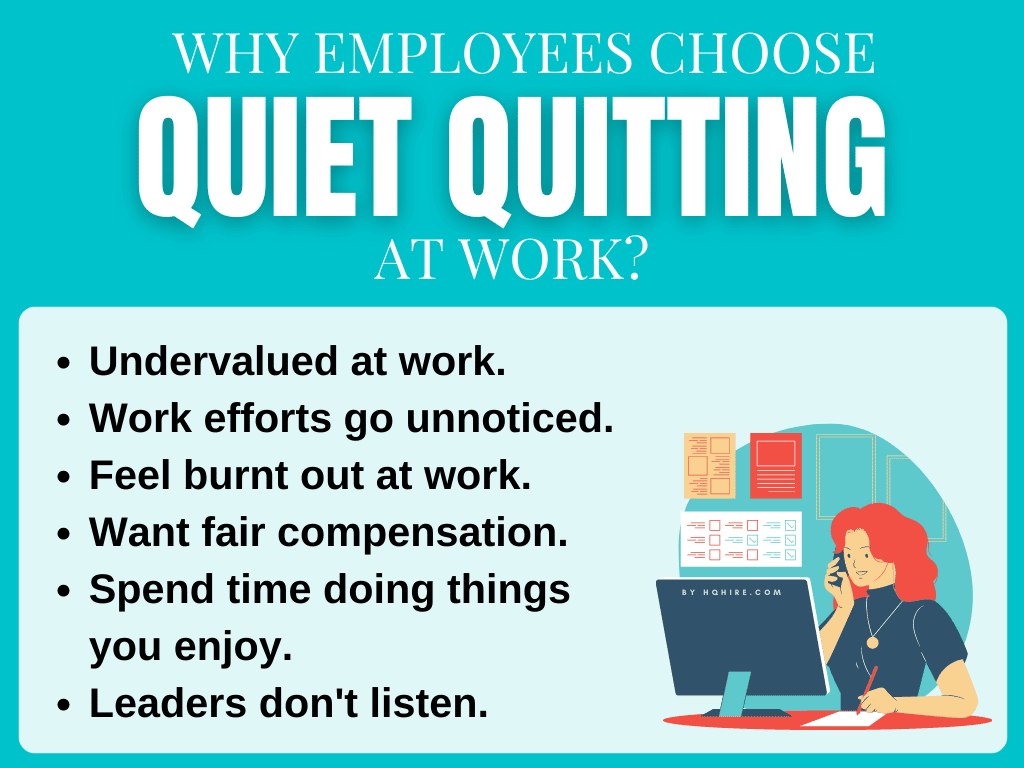Social media is buzzing with the concept of “Quiet Quitting.” But contrary to what the name implies, the movement is very different for the majority of advocates.
What is “Quiet Quitting”?
Quiet quitting refers to the idea of giving up on the notion of going above and beyond at your job, but not actually quitting.
“Quiet Quitting” is a new name for an old reality at work.
The term, “Quitting” however, is misleading since it relates to the concept of only doing the bare minimum, rather than terminating your career or work entirely. This concept can also be used when searching for other employment while maintaining your current employment job.
Quiet quitters have made a conscious decision to reduce their excitement for the job and instead take a bare-bones approach to complete their work tasks.
For example, when asked to take on additional responsibilities outside of their job description, they will most likely respond “no.”
The most common reasons why individuals choose to quiet quit are because they feel as though their work is undervalued and their efforts go unnoticed. Nonetheless, there are many ways to stop quiet quitting, and the best way is to let the employee feel appreciated at work.
Why is Quiet Quitting Gaining Popularity?
Quiet quitting gained popularity on Tik-Tok, and got massive adoption by Generation Z as this trend spread to other social networks, media outlets, and job search websites.
The concept gain its popularity as “quiet quitting” is meant to prevent the rising experiences of burnout, being taken advantage of, working more hours than necessary, and performing tasks beyond those for which you were recruited but not paid.
The concept of “Quiet Quitting” helps to verbalize what an average employee thinks about work. It is a silent protest against the hustle culture-mentality at work.

Additionally, it gives a voice and a platform to everyone who is really frustrated with how they believe their companies are treating them.
For example, since the pandemic, many individuals feel as though the companies they work for are taking advantage of them constantly and making them go back to in-person work when remote work was reasonable and beneficial.
With the major push of 4 days work week, more countries offer 4 days work week. More and more data show many benefits of having a shorter workweek and a more balanced way of work. The hustle culture-mentality doesn’t seem to make sense which makes “Quiet Quitting” a popular concept in the post-pandemic era.
Why Is It Called Quiet Quitting?
The term “Quiet Quitting” was popularised by a TikTok user, “zaidleppelin” who advised his followers to stop “subscribing to the hustle-culture mentality that work has to be your life” and that “your worth as a person is not defined by your labor output”.
Although in his video, he stated he is not the inventor but has heard it from somewhere, his 17 seconds video has gained over half a million views in just a few days.
It is termed “Quiet Quitting” because the employee is not exactly quitting the job, but quitting from the hustle mentality of being in the job.
“Quiet Quitting” is the act of rebalancing the priority of your job and your personal life.
Why Do People Quiet Quit Their Jobs?
Quiet quitting provides individuals with a sense of control over the feelings that so many millions of people are experiencing in their workplace right now. Additionally, it gives them some fresh perspectives on how to reclaim the authority over their life that they so desperately need and want.
- Taking sick leave when the employees are not feeling well.
- Taking weekends off work so they can rejuvenate and let their mind and body rest.
- Stop thinking about work at night so they can get their sleep and prepare their body and mind for the day.
- Asking to work from home when required.
- Asking to leave work early for urgent matters.
- Asking to get out of the night shift.
Quiet quitting has also helped many individuals take the necessary steps that helped them feel more in control of where they were going and how they were living their lives, much like The Great Resignation (or Re-evaluation) movement did for professionals with serious concerns about their work and work-lives.
Additionally, it helps managers and leaders in realizing the gravity of the issue within the workplace and their leadership style.
Is Quiet Quitting Good?
Quiet quitting can be beneficial to your personal mental health and personal life to gain work/life balance, but the concept of “Quiet Quitting” can hurt your career progression and your relationship with your boss.
“Quiet Quitting is a coping strategy that employees adopt to protect themselves from overwork or getting burnout.”
The problem of “Quiet Quitting” lies with the employer or managers which causes the employees to choose “Quiet Quitting” at work in order to protect their mental and personal health.
As an employee, if you find yourself “Quiet Quitting” your job, it might be wise to,
- Either talk to your employer to change things for the better,
- Or find a new job that will suit you better.
If your work environment forces you to “Quiet Quit” at work, the work environment may not be a great work environment that you may want to stay for long.
Read Also:
Join over 11,000+ achievers who are committed to achieving their career goals!






